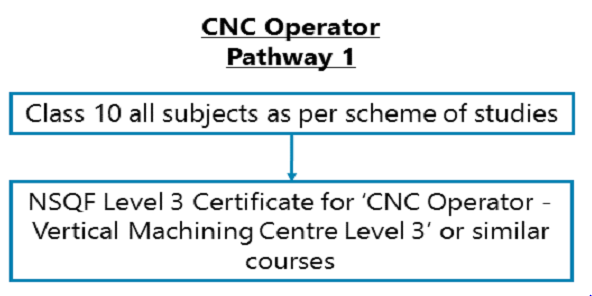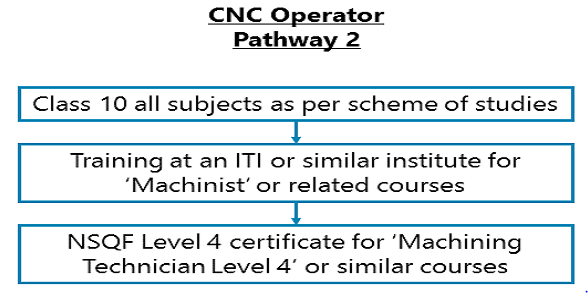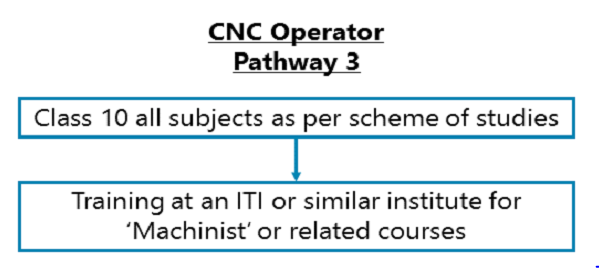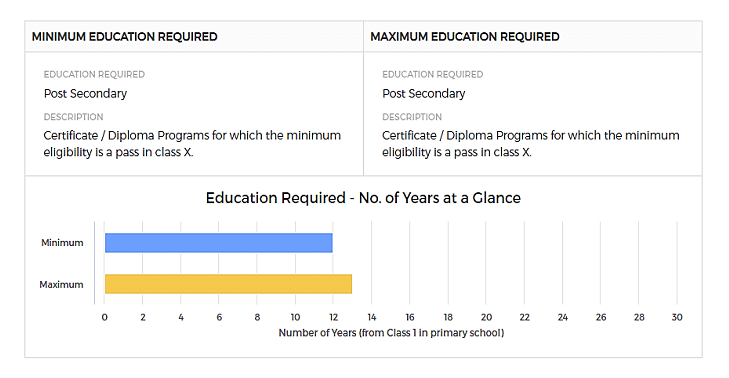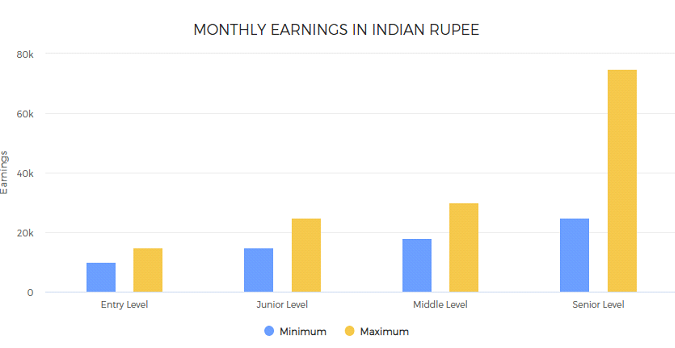CNC Operator
Entry Level Qualification
10
Career Fields
Draughtsman & Operator
For Specially Abled






Career Entrance Exam
About Career
CNC means Computer Numerical Control. Using CNC, different working specifications or parameters of various machines could be automated – specifications or parameters such as the thickness, length, breadth, shapes, and patterns for constructing a metal plate could be automated using CNC. Almost all the machines used for the construction of metal parts, wooden parts, plastic parts, and parts of other materials are CNC operated nowadays.
CNC Operators operate various CNC or automated machining tools such as drills, boring tools (it is a tool that is used in metalworking and woodworking), lathes (a machine used to perform various operations such as cutting, sanding, drilling of metals), etc.
CNC also helps in automated control of various 3D printers. All automated control processes are run with the help of computers. By using a coded programmed instruction and without using manual operation, a CNC machine is used for processing a piece of material such as metal, plastic, wood, ceramic or composite, etc. to meet a particular specification.
As a CNC Technician, you will be working as an Assistant Machinist, Junior Machinist, Lathe Operator, Apprentice Machinist, Semi-skilled operator. You will be involved in the process of supporting the machine operator in various pre-machining activities, machining of the actual part, ad hoc repair works, de-burring, and other inspection related activities. You will be working as a set-up and base level operator for various machine tools which can be performed both manually and with the help of automatic machines or tools.
On the other hand, as a CNC Operator, you will be working as a machinist or programmer who with the help of computer-driven machines and tools makes various components for the construction of aerospace, computer, medical, recreational, and other industrial equipment. You will be reading blueprints and schematics, making specific measurements, programming and operating CNC machines with the help of various software. You will also be selecting the best tools and techniques for working on specific materials.
As a CNC Grinder Operator, you will be involved in all the CNC grinding operations by following all the safe working processes and approved procedures. You will be continuously monitoring the machining operations. You will be responsible for making minor adjustments or will be seeking the help of the setters for making the required adjustments to ensure that the output met the required quality and accuracy.
Key Roles and Responsibilities
As a CNC Operator, you will be engaged in all or some of the following roles and responsibilities:
1. You will be assisting in carrying out all or some of the pre-machining as well as post-machining operations or activities.
2. You will be operating machines and various tools manually or by using CNC systems, observe the process progression using CNC control panels.
3. You will be setting various machining parameters in the computer software as per engineering drawings and specifications.
4. You will be making adjustments to the machining operations or in the CNC systems to ensure that the machining is being done as per requirements.
5. You will be supporting the operator in performing various machining operations.
6. You will be operating the machine tool controls maintaining all safety rules following the established protocol.
7. You will be maintaining a safe and healthy working environment.
Career Entry Pathway
Class 10 all subjects as per scheme of studies –NSQF Level 3 Certificate for ‘CNC Operator - Vertical Machining Centre Level 3’ or similar courses
After Class 10, you can pursue National Skill Qualifications Framework (NSQF) Level 3 certificate for ‘CNC Operator - Vertical Machining Centre Level 3’ or similar courses after 2-3 years of work experience in different Machining activities. The total number of training hours is 400. You can also join the NSQF course directly after Class 11-12 or after vocational training at an ITI or similar institute for ‘Machinist’, ‘Mechanical’ or related courses.
Class 10 all subjects as per scheme of studies– training at an ITI or similar institute for ‘Machinist’ or related courses- NSQF Level 4 certificate for ‘Machining Technician Level 4’ or similar courses
After Class 10, you can go for training at any Industrial Training Institute (ITI), National Skill Training Institute (NSTI), Regional Vocational Training Institute (RVTI), National Vocational Training Institute (NVTI), Industrial Training Center (ITC), Workshop Training Institute (WTI) or other vocational institutes for ‘Machinist’, ‘Machinist (Grinder)’, ‘Machinist Vidhyut’, ‘Machinist Composite’, ‘Integrated Machinist’, ‘Machinist (Comp.)’ or related courses. You will sit for the All India Trade Test (AITT) to get a National Trade Certificate (NTC) after this course. This exam is held twice a year in the months of February and July. Then pursue National Skill Qualifications Framework (NSQF) Level 4 training and certificate for ‘Machining Technician Level 4’ or similar courses. The total number of training hours is 400.
Class 10 all subjects as per scheme of studies – training at an ITI or similar institute for ‘Machinist’ or related courses
After Class 10, you can go for training at any Industrial Training Institute (ITI), National Skill Training Institute (NSTI), Regional Vocational Training Institute (RVTI), National Vocational Training Institute (NVTI), Industrial Training Center (ITC), Workshop Training Institute (WTI) or other vocational institutes for ‘Machinist’, ‘Machinist (Grinder)’, ‘Machinist Vidhyut’, ‘Machinist Composite’, ‘Integrated Machinist’, ‘Machinist (Composite)’ or related courses. You will sit for All India Trade Test (AITT) to get a National Trade Certificate (NTC) after this course. This exam is held twice a year in the months of February and July.
Required Qualification & Competencies
After class 10, you can go for:
1. ITI Training courses.
2. NSQF Training courses, Level 3 or Level 4 certifications.
Also following are the additional educational requirements for getting enrolled for CNC Operator course:
3. As per the ASDC (Automotive Skills Development Council) guidelines, the candidate should seek full employment not before attaining the age of 18 years.
4. However, as per the Factories Act 1948 - No one can be employed before attaining the age of 15. A person between the age of 15 – 18 (both inclusive) could be employed only with employers who follow safety and security systems & processes and also that the employee in this bracket will be working under supervision.
5. However, the Factories Act 1948 is different for different States. It might have a slightly varying provision which needs to be adhered to.
COMPETENCIES REQUIRED
Interests
1. Realistic: You should have interests for Realistic Occupations. Realistic occupations involve more practical and hands-on activities than paperwork or office work. Realistic occupations often involve physical activities for getting things done using various tools and equipment.
2. Enterprising: You should have interests for Enterprising Occupations. Enterprising occupations involve taking initiatives, initiating actions, and planning to achieve goals, often business goals. These involve gathering resources and leading people to get things done. These require decision making, risk taking and action orientation.
3. Conventional: You should have interests for Conventional Occupations. Conventional occupations involve repetitive and routine tasks as well as fixed processes or procedures for getting things done. These occupations involve working more with data, systems, and procedures and less with ideas or creativity.
Knowledge
1. Organizational Knowledge: Knowledge of various relevant standards and procedures followed by the company or organization. This includes knowledge about different types of products manufactured by the company.
2. Technical Knowledge: Knowledge of different types of machining processes which include knowledge of different types of tools used in the machining process. Knowledge of the coolants and lubricants applications.
3. You must have knowledge of basic Arithmetic and Calculation Methods.
4. You must have knowledge of drawing, standard designing.
Skills
1. Operating: Skills in operating various machines, equipment, devices and systems.
2. Critical Thinking: Skills in analysis of complex situations, using of logic and reasoning to understand the situations and take appropriate actions or make interpretations and inferences.
3. Quality Control Analysis: Skills in conducting tests and inspections of products, services, or processes to evaluate quality or performance.
4. Process and Operation Controlling: Skills in controlling processes and operations of various machines, equipment, devices and systems using different types electrical and electronic control instruments and systems.
5. Active Listening: Giving full attention to what other people are saying, understanding the points being made by others, asking questions, etc.
6. Judgment and Decision Making: Skills in considering pros and cons of various decision alternatives; considering costs and benefits; taking appropriate and suitable decisions.
7. Time Management: Skills in prioritizing work, managing time effectively.
Abilities
1. Arm-Hand Steadiness: The ability to keep your hand and arm steady while moving your arm or while holding your arm and hand in one position.
2. Auditory Attention: The ability to focus on a single source of sound in the presence of other distracting sounds.
3. Control Precision: The ability to quickly and repeatedly adjust the controls of a machine or a vehicle to exact positions.
4. Near Vision: The ability to see details at close range (within a few feet of the observer).
5. Hearing Sensitivity: The ability to detect or tell the differences between sounds that vary in pitch and loudness.
6. Problem Sensitivity: The ability to tell when something is wrong or is likely to go wrong. It does not involve solving the problem, only recognizing there is a problem.
Personality
1. You are always or mostly organized in your day-to-day life and activities.
2. You are always or mostly careful about your actions and behavior.
3. You are always or mostly disciplined in your action and behavior.
4. You are always or mostly helpful to others.
5. You are always calm or generally remain calm in most situations.
Career - Job Opportunities & Profiles
You will get job roles like Junior Machinist, Assistant Machinist, CNC Machinist, ITI Machinist, Lathe Operator, Apprentice Machinist, Semi-skilled Operator, Machining Technician, Turner, Grinder, etc.
Some of the industries that will require your services are:
1. Industrial Products / Heavy Machinery
2. Automobile / Auto Ancillary / Auto Components
3. Oil and Gas / Energy / Power / Infrastructure
4. Construction / Engineering / Cement / Metals
5. Railways
6. Government / Defence
7. Iron and Steel
8. Water Treatment / Waste Management
9. Architecture and Facility Management
SPECIALISATION TRACKS IN THIS CAREER
CNC Machining Technician Level 3
CNC Machining Technician Level 3 also known as Assistant Machinist, Junior Machinist, Lathe Operator, Apprentice Machinist, Semi-skilled operator; is involved in the process of supporting the machine operators in all pre-machining activities, additional repair work, or in machining the actual parts such as in auto service stations, gauging, de-burring and inspection activities.
CNC Operator Turner
CNC Operator Turner is involved in the process of inspecting the components and continuously monitoring the machining operations. You will be responsible for making minor adjustments to meet the required quality and accuracy.
CNC Operator – Grinding Machine Centre
As a CNC Operator- Grinding Machine operator, you will be involved in carrying out CNC Grinding operations in line by using safe working practices and approved standards. You will be performing grinding operations on the range of metal components by using CNC Machines.
From entry-level job positions as a CNC Operator, Junior CNC Operator/Machinist, Apprentice CNC Operator/Machinist, Assistant CNC Operator/Machinist, etc you will grow up to roles like Senior Technician (Machinist); Machinist Supervisor; Master Machining Technician, etc.
Salary Offered
1. Salaries vary according to job profiles and the kind of facilities you get to work at.
2. In the entry-level jobs: You may expect to get about Rs. 10,000– Rs.15,000 per month.
3. Salaries increase with your work experience and as you get promoted.
4. In junior-level roles, you can expect to earn about Rs. 15,000 - 25,000 or more per month.
5. In the mid-level jobs, with 6-12 years of work experience, you may expect to get about Rs. 18,000– Rs.30, 000 per month.
6. In the senior-level jobs, with 12-15 years of work experience, you may expect to get about Rs. 25,000 – Rs.75, 000 per month or even more.
MONTHLY EARNINGS IN INDIAN RUPEE
1. Entry level: 0 - 2 years of work experience
2. Junior Level: From 1 to 12 years of work experience
3. Mid Level: From 5 to 20+ years of work experience
4. Senior Level: From 10 to 25+ years of work experience (there could be exceptions in some high-end technical, financial, engineering, creative, management, sports, and other careers; also in the near future, people will reach these levels much faster in many careers and in some careers, these levels will have no meaning as those careers will be completely tech skill driven such as even now, there is almost no level in a Cyber Security Expert’s job).
Work Activities
As a CNC Operator, you will be involved in the following work activities:
1. Operating machines, equipment, devices, systems and processes: Using various methods and techniques to operate machines, equipment, devices, systems, and processes in industrial and other settings.
2. Getting Information and learning: Observing, hearing, reading, using computers, or otherwise obtaining information and learning from it.
3. Communicating with co-workers and others: Communicating with people in writing, verbally or otherwise inside your workplace and various other people who have professional relationships with your place of work including vendors, government officials, etc. or with people at large.
4. Decision making and problem-solving: Analysis of data and information; evaluation of alternative decisions and results of decisions; taking the right decisions and solving problems.
5. Inspecting equipment, systems, structures, and materials: Inspecting equipment, systems, structures, and materials to ascertain quality, performance, defects, causes of errors, etc.
6. Handling and moving objects and materials: Using hands or otherwise use physical strength to handle and move objects and materials; manoeuvre, install, lift, place, manipulate, etc.
7. Identifying objects, actions, and events: Identifying various characteristics of objects; observing and understanding actions and events; understanding changes in actions and events.
8. Monitoring processes, systems, and performance: Observing and recording information on various criteria to monitor mechanical, electronic, electrical and other processes and systems; monitoring the progress of projects and tasks.
9. Updating and using relevant knowledge: Keeping updated with the latest knowledge relevant to your fields of work and use of the relevant knowledge in getting things done.
10. Using computers for work: Using computers for day-to-day office work; using computer software for various applications in day-to-day professional work; entering data and process information; for writing.
Future Prospects
The future for this pathway seems to show decent growth. India is predicted to become the world’s 5th largest economy and reach the 4.7 trillion US Dollars mark by 2023. Skilled Operators will be required to fill in the skill gaps as the following trends are expected to grow in the near future in the Indian Economy. The capital goods industry turnover is forecasted to reach the mark of 115.17 billion US Dollars by 2025. Electrical equipment market production is expected to reach 100 billion US Dollars mark by 2022. Engineering Research and Design revenues are forecasted to reach 42 billion US Dollars by 2022. The construction equipment market is expected to touch 7 billion US Dollars mark by2020. The contribution of Indian Automotive Components and OEM (Original Equipment Manufacturer) Industry to the global turnover is expected to double by 2026.


